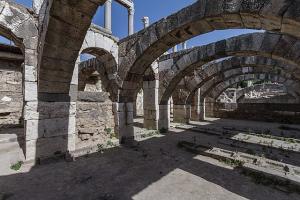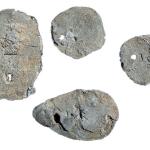St. Polycarp (69-155) was the bishop of Smyrna, and was a disciple of St. John, according to St. Irenaeus (c. 130-c. 202) and Tertullian (c. 155-c. 220). Protestant apologist Jason Engwer, the main blogger at Triablogue, recently wrote the article, “Baptism and Justification in Polycarp” (1-26-23). This is my response to it. His words will be in blue, Polycarp’s in green.
*****
Polycarp’s Letter To The Philippians [link] occasionally discusses soteriological issues, but not in a lot of depth. For example:
‘In whom, though now ye see Him not, ye believe, and believing, rejoice with joy unspeakable and full of glory;’ [1 Pet 1:8] into which joy many desire to enter, knowing that ‘by grace ye are saved, not of works,’ [Eph 2:8-9] but by the will of God through Jesus Christ….If we please Him in this present world, we shall receive also the future world, according as He has promised to us that He will raise us again from the dead, and that if we live worthily of Him, ‘we shall also reign together with Him,’ provided only we believe. ([Chapters] 1, 5)
The focus is on faith, but he requires works in some sense as well, probably in the sense of works being the fruit of justifying faith. Just before what I quoted in section 1 of the letter, Polycarp refers to how “the strong root of your faith, spoken of in days [Phil 1:5] long gone by, endureth even until now, and bringeth forth fruit to our Lord Jesus Christ”. He had noted that justification is “not of works”. He connects that comment in section 1 of the letter to 1 Peter 1:8, which refers to believing in Jesus. . . .
Near the end of Polycarp’s letter, he refers again to those who “shall believe in our Lord Jesus Christ” (12). . . . The most natural reading of the references to faith is that they’re meant in an unqualified sense, . . . [i.e., faith alone].
Baptism isn’t mentioned in the letter, so we can’t know for sure what St. Polycarp thought about that. Jason seems to think that this omission is significant. I do not. It’s simply one fairly short letter, so not “everything” will be mentioned in it. He didn’t mention the Eucharist or bishops in it, either, and we know that the entire early Church celebrated the Eucharist, and that he himself was a bishop.
But let’s examine whether he believed in faith alone: one of the two “pillars” of the Protestant so-called “Reformation.” Jason concedes that St. Polycarp “requires works in some sense”, but then opines that it’s “probably in the sense of works being the fruit of justifying faith”. This is the classic Protestant understanding of works: taught by both Luther and Calvin. It removes from good works any hint of merit or causal relation to to salvation (even if understood as always in conjunction with works and soaked with and enabled by grace).
Works are simply done in gratitude to God for the salvation already granted through faith alone. They have no direct relationship to salvation (even though I have found fifty Bible passages that teach that they definitely do have a very close relationship). Sanctification is formally separated from justification and salvation in Protestant thought. Good works are promoted, but in the final analysis, they aren’t required for salvation. This is the meaning of faith alone.
The Catholic view, on the other hand, is that a person is justified by grace alone through faith, with the necessary addition (after initial justification) of meritorious good works: without which faith is dead. We do not believe in salvation by works alone. That is the heresy of Pelagianism or Semi-Pelagianism (which we are often falsely accused of believing by those who haven’t studied Catholic soteriology).
The Wikipedia article on Polycarp takes a view similar to Jason’s, as to the Church father’s soteriology:
Polycarp’s soteriology is not clear; he does cite Ephesians 2:8 to say salvation is by grace rather than works, though later exhorts his readers to do good works. It is not clear from the text how he views works in relation to salvation as his comments are too little to make a clear conclusion. He could have believed that works are mere results of saving grace or that they are necessary to keep salvation and that they have meritorious value, thus we cannot know if he was a monergist or a synergist.
I shall argue that we have enough information in this letter from St. Polycarp, to determine that he held to a Catholic soteriology, not a “proto-Protestant” one.
St. Polycarp, in asserting that salvation is “not of works” (citing Ephesians 2) is simply condemning salvation by works or by self-generated works, apart from grace (i.e., Pelagianism). No one disagrees with that, so it’s not at issue. It’s not the same thing as an assertion of “faith alone.” Many Protestants fail to comprehend the fine but crucial logical distinctions in play.
Jason implies that St. Peter teaches faith alone. He doesn’t. In the same First Epistle, he directly ties works and merit to salvation:
1 Peter 4:17-19 (RSV) For the time has come for judgment to begin with the household of God; and if it begins with us, what will be the end of those who do not obey the gospel of God? [18] And “If the righteous man is scarcely saved, where will the impious and sinner appear?” [19] Therefore let those who suffer according to God’s will do right and entrust their souls to a faithful Creator.
He also teaches baptismal regeneration, or justification, stating that baptism “saves” us (1 Pet 3:21).
Already in his second chapter, St. Polycarp makes it very clear that he believes in the Catholic view of justification by grace alone through faith, with the necessary addition of meritorious good works: without which faith is dead, and salvation unattainable:
But He who raised Him up from the dead will raise us up also, if we do His will, and walk in His commandments, and love what He loved, keeping ourselves from all unrighteousness, covetousness, love of money, evil speaking, false witness;
not rendering evil for evil, or railing for railing,or blow for blow, or cursing for cursing, but being mindful of what the Lord said in His teaching:Judge not, that you be not judged; forgive, and it shall be forgiven unto you; be merciful, that you may obtain mercy; with what measure you measure, it shall be measured to you again;and once more, “Blessed are the poor, and those that are persecuted for righteousness’ sake, for theirs is the kingdom of God.” [ch. 2; added verse numbers removed, but he cites five passages in this section; my italics and bolding]
This is extraordinary! Note the bolded “if.” Our resurrection (which means salvation, since only the saved will be resurrected to glory) is conditional upon doing various works. God will “raise us up” if we “do His will” (a work, especially indicated by the “do”), if we “walk in His commandments” (several works), and if we avoid nine different sins: the avoidance of which amounts to meritorious action and behavior. That’s at least eleven things that are necessary in order for us to be saved and resurrected, followed by five more things that are opportunities for meritorious actions leading (in faith and grace) to salvation.
If St. Polycarp in fact thought like a Protestant (in this regard of salvation), this section would have been much shorter. He would have written something like, “But He who raised Him up from the dead will raise us up also, if we believe in Him in faith alone.” All of the rest would have been relegated to a good and praiseworthy, yet optional sanctification: not related to salvation at all. But Polycarp makes our resurrection conditional upon doing all these good works and behaving the right (Christlike) way. It’s very Catholic and exceedingly unlike Protestantism.
All of this (!), and yet Jason thinks St. Polycarp believes in faith alone and not in merit and the Catholic conception of sanctification and good works (and the Wikipedia article thinks his soteriology isn’t “clear”)? I don’t see how, even giving Jason some slack for his Protestant bias (we all have bias and predispositions one way or another).
If we please Him in this present world, we shall receive also the future world, according as He has promised to us that He will raise us again from the dead, and that if we live worthily of Him,
we shall also reign together with Him,[2 Tim 2:12] provided only we believe. (ch. 5; my bolding and italics)
This is again the Catholic doctrine of merit and good works as necessary in salvation, in conjunction with faith. Faith isn’t alone. This is the furthest thing imaginable from faith alone. It reminds me of this similar passage: “and if children, then heirs, heirs of God and fellow heirs with Christ, provided we suffer with him in order that we may also be glorified with him” (Rom 8:17).
neither fornicators, nor effeminate, nor abusers of themselves with mankind, shall inherit the kingdom of God,[1 Cor 6:9-10] (ch. 5)
He cites St. Paul in agreement. Paul is expressing merit in the opposite manner: those who habitually commit various sins and don’t cease, won’t be saved, as opposed to writing, “those who don’t have faith alone won’t inherit the kingdom of God.”
When you can do good, defer it not, because
alms delivers from death.[Tobit 4:10, 12:9] (ch. 10)
Once again, he espouses Catholic meritorious action, leading to salvation, with two deuterocanonical references thrown in as an extra bonus and a Three Stooges-like poke in the Protestant “eye.” Alms (and doing “good” in general) aren’t just nice and touchy-feely, warm fuzzy actions, done in gratitude to God for an existing, salvation that can’t be lost. No!; they can actually “deliver” one from eternal damnation.
St. Polycarp clearly would have flunked out of any evangelical Protestant or Calvinist seminary (but not before mercilessly tormenting his Protestant professors first, with innumerable “Catholic verses” from the Bible . . .).
***
Practical Matters: Perhaps some of my 4,000+ free online articles (the most comprehensive “one-stop” Catholic apologetics site) or fifty books have helped you (by God’s grace) to decide to become Catholic or to return to the Church, or better understand some doctrines and why we believe them.
Or you may believe my work is worthy to support for the purpose of apologetics and evangelism in general. If so, please seriously consider a much-needed financial contribution. I’m always in need of more funds: especially monthly support. “The laborer is worthy of his wages” (1 Tim 5:18, NKJV). 1 December 2021 was my 20th anniversary as a full-time Catholic apologist, and February 2022 marked the 25th anniversary of my blog.
PayPal donations are the easiest: just send to my email address: [email protected]. You’ll see the term “Catholic Used Book Service”, which is my old side-business. To learn about the different methods of contributing, including 100% tax deduction, etc., see my page: About Catholic Apologist Dave Armstrong / Donation Information. Thanks a million from the bottom of my heart!
***
Photo credit: Arches from ancient Smyrna in western Turkey [Izmir Agora Archs / Benh LIEU SONG from Torcy, France / Creative Commons Attribution-Share Alike 2.0 Generic license]
***
Summary: St. Polycarp (69-155), disciple of the apostle John, did not believe in faith alone: the Protestant view of salvation, but rather, salvation by faith + meritorious works.














